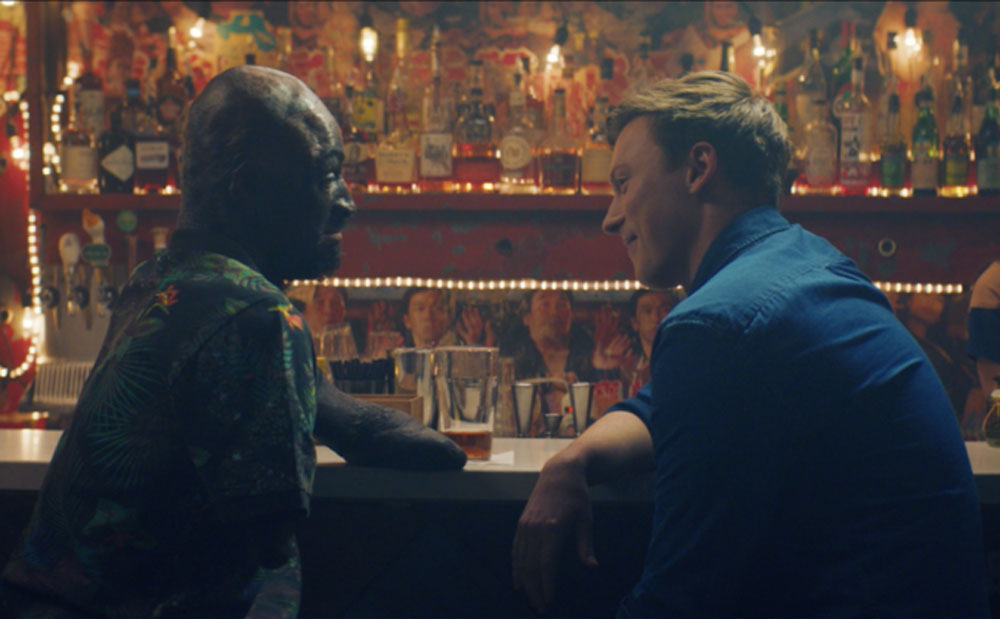After making “The Things You Think I’m Thinking,” it was Sherren Lee’s turn to wonder what others might think, particularly the film’s star Prince Amponsah, since it was the first time the actor would see himself onscreen after he survived an apartment fire which badly burned his skin and took his forearms in 2012.
“It’s funny because he didn’t really tell me, but the first time we watched it, he was just very polite,” recalls Lee, on the eve of the short film’s Los Angeles premiere at Outfest. “And then we watched it again at another screening and he said to me, ‘Okay, this time I was able to enjoy it a little bit more.’ I’m sure it was a little strange to see himself on the big screen and we all have our hang-ups about the way we look and especially for him, it’s so brave to put himself on the big screen with all of his scars. I don’t want to speak for him, but when the audience responses have been so positive, I think it’s been really positive for him as well.”
It becomes impossible to look at Amponsah in any other light than a dashing romantic lead in “The Things You Think I’m Thinking,” which itself began life as a love letter to the actor penned by his friend and fellow actor Jesse LaVercombe. Naturally, the film revolves around a date, but for those that might not know better, you can’t immediately be sure if there’s a love connection between Amponsah and LaVercombe’s on-screen alter egos Sean and Caleb, respectively, as they start to get to know each other. Playful chitchat over recreational pot use commences, but the evening grows serious as one can see that no matter how alluring Sean finds Caleb, for whom his appearance poses no issue, there’s the not-so-small issue of having his defenses up for so long following his disfigurement that letting them down proves to be a challenge.
Nonetheless, Lee brings out the beauty in “The Things You Think I’m Thinking,” featuring nuanced performances from Amponsah and LaVercombe and setting a cool, relaxed vibe that seduces you as readily as Sean and Caleb work their magic on each other. It’s a charmer all on its own, but also a suggestion of greater things for its director, who is currently working towards her debut feature, about a woman seeking to end her life, but not before spending 15 days with a group of people looking for help in the same way. Taking a break from workshopping the provocative drama, Lee spoke how “The Things You Think I’m Thinking,” doing right by her star Amponsah and making the most out of a limited shoot.
How did this come about?
The script came to me from Jesse LaVercombe, who is the writer and also one of the actors in the film, and we knew each other [because] I directed him in his final showcase piece at the Canadian Film Centre, kind of like the Canadian version of AFI, and he [had] met Prince through the theater community and wrote the piece specifically for him. The story was loosely based on their first encounter with each other — it wasn’t romantic, as far as I know [laughs] — but that feeling of first meeting somebody and getting to know them and trying to walk on eggshells a tiny bit, trying to get to know each other in a respectful, but also charming way. When Jesse brought me the script, it was very much about Prince and I really was interested in talking about Prince as someone who is just like everybody else. I wanted to focus on empathy and not focus on how he’s different, but how he’s like us. We worked together on it for about a year and reworked it a bunch of times and we made it.
What was it like for you to get to know Prince? Was it a process of getting to know what he could do and what he couldn’t do on camera?
Yeah, I met with Prince way before we shot and of course, the first time I met him, there’s always all of these questions that you suddenly become aware of, like [thinking] “Oh no, how am I going to shake his hand?” That’s such a simple thing that we do that’s a social norm, and I was feeling so nervous about it, but as soon as I met him, he just came right in for a hug. Right away, he was very, very warm and very honest and pointed out his own boundaries. We went for coffee and he was able to pick up his own mug, but he would ask for help in areas that he needed [it]. Mostly, I was impressed by how agile he was and how much he could actually do himself, so I really wanted to show that. One of the most rewarding things was when my producer Charlie was on set and said to me, “When I read the script, I was like ‘Whoa, how is [Prince] going to do all of this?’ But just being able to watch him do it really well without assistance is already really informative and helps people better understand what his life is like.
There’s a scene in which he opens a beer can with his teeth – was that something you knew he could do?
The beer can scene came about because Jesse had seen Prince do it, so a lot of it was based on what they went through. I actually think that happened when they first met. That whole cigarette [scene that follows came from] asking Prince how would you light a cigarette, and [then], “Is it okay that we ask you to have your face so close to the burner?” It’s something he does all the time, so he was totally fine with it. It definitely relied a lot on Prince to tell us how he actually lives his life, [which was] as simple as [asking] where to hang his necklaces or where to place the cologne he actually sprays on himself. All of that was a discussion.
What was it like to create the production design in his apartment?
I didn’t want to portray someone who was differently abled who lives in a basement apartment and has nothing in his house. We’ve seen that a lot – people who are kind of ostracized and isolated and have no friends, so I wanted to show him in a space that was beautiful and with lots of friends and lots of warmth and show a life that he’s always had, a life that was created before his incident. If you notice, there’s a statue of his hand on his bedside table and that was deliberate. Jessica, our production designer, had a good sense of humor and great eye, obviously, and we actually brought a lot of the art just to shape the environment.
I loved the lighting of it – I felt that tied it all together between the three separate scenes – at the birthday party, in the bar and back at the apartment. How did you figure that out?
I have a great [cinematographer] Ian Macmillan and we always spend a lot of time talking about what what each scene is going to look like and how we want it to feel, and he’s the one that comes up with all the techniques of how to do it. I really wanted to start the film in a warm space, and then you cut to a stark shot of Prince looking at himself in the mirror and it’s a big contrast, going back and forth between that warmth and coldness.
I [also] love to play with the actors on the day to see how we like to move and what they would like to do. There’s not a lot of time to rewrite your plan, so I do plan a lot how I want to shoot it and how I want it to look, so generally I will come in and let them know generally where I want them to land and see how that goes. then it’s a bit of a back and forth about what works for them and what works for me in the shot and where to place a camera. especially that first scene, it’s a one shot scene and that was one of my favorite parts of shooting because we had to work with the DP, the steadicam operator and all the actors to figure out timing. it was a bit of a dance in that small space that we had.
What’s it been like traveling with it and seeing audience’s reactions to it?
It’s been such a joy. It’s always a mystery if people will like it, but then we premiered at Slamdance and that really kicked us off and going to these bigger festivals like SXSW really allowed us to have more reach and the stories that people come back to us with are always so humbling. You never know how your film is going to affect somebody and how it is going to connect with it in their own ways with their own stories, so hearing those stories have been very rewarding and the best part to me is that everyone relates to this story. We’ve all been on that first date and we’ve all been nervous or scared that the other person will see right through us and like us for the wrong reasons or not like us for the wrong reasons, so that’s the most rewarding [part] because I want to make movies for that everyone can see themselves in.
“The Things You Think I’m Thinking” will play at Outfest as part of the Boys Shorts program on July 14th at DGA 1 at 11 am and July 19th at DGA 2 at 10 pm.




